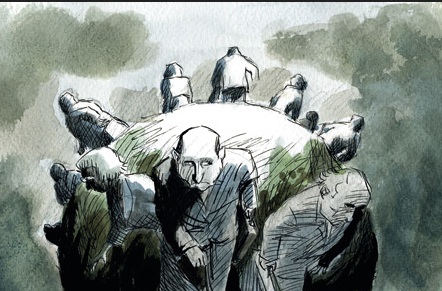Mohamed El_Erian writes: In the coming year, “divergence” will be a major global economic theme, applying to economic trends, policies, and performance. As the year progresses, these divergences will become increasingly difficult to reconcile, leaving policymakers with a choice: overcome the obstacles that have so far impeded effective action, or risk allowing their economies to be destabilized.
The multi-speed global economy will be dominated by four groups of countries. The first, led by the United States, will experience continued improvement in economic performance. Their labor markets will become stronger, with job creation accompanied by wage recovery. The benefits of economic growth will be less unequally distributed than in the past few years.
The second group, led by China, will stabilize at lower growth rates than recent historical averages, while continuing to mature structurally. They will gradually reorient their growth models to make them more sustainable.
The third group, led by Europe, will struggle, as continued economic stagnation fuels social and political disenchantment in some countries and complicates regional policy decisions. Anemic growth, deflationary forces, and pockets of excessive indebtedness will hamper investment, tilting the balance of risk to the downside
The final group comprises the “wild card” countries, whose size and connectivity have important systemic implications. The most notable example is Russia. Faced with a deepening economic recession, a collapsing currency, capital flight, and shortages caused by contracting imports, President Vladimir Putin will need to decide whether to change his approach to Ukraine, re-engage with the West to allow for the lifting of sanctions, and build a more sustainable, diversified economy.
The alternative would be to attempt to divert popular discontent at home by expanding Russia’s intervention in Ukraine.
Brazil is the other notable wild card. President Dilma Rousseff, chastened by her near loss in the recent presidential election, has signaled a willingness to improve macroeconomic management, including by resisting a relapse into statism, the potential benefits of which now pale in comparison to its collateral damage and unintended consequences.
This multi-speed economic performance will contribute to multi-track central banking, as pressure for divergent monetary policies intensifies, particularly in the systemically important advanced economies. The US Federal Reserve, having already stopped its large-scale purchases of long-term assets, is likely to begin hiking interest rates in the third quarter of 2015. By contrast, the European Central Bank will pursue its own version of quantitative easing, introducing in the first quarter of the year a set of new measures to expand its balance sheet. The Bank of Japan will maintain its pedal-to-the-metal approach to monetary stimulus.
The problem is that exchange-rate shifts now represent the only mechanism for reconciliation.
For the US, the combination of a stronger economy and less accommodative monetary policy will put additional upward pressure on the dollar’s exchange rate.
Moreover, as it becomes increasingly difficult for currency markets to perform the role of orderly reconcilers, friction may arise among countries. This could disturb the unusual calm that lately has been comforting equity markets.
Fortunately, there are ways to ensure that 2015’s divergences do not lead to economic and financial disruptions. Indeed, most governments have the tools they need to defuse the rising tensions and, in the process, unleash their economies’ productive potential.
Avoiding the disruptive potential of divergence is not a question of policy design; there is already broad, albeit not universal, agreement among economists about the measures that are needed at the national, regional, and global levels. Rather, it a question of implementation – and getting that right requires significant and sustained political will.
The pressure on policymakers to address the risks of divergence will increase next year. The consequences of inaction will extend well beyond 2015.

